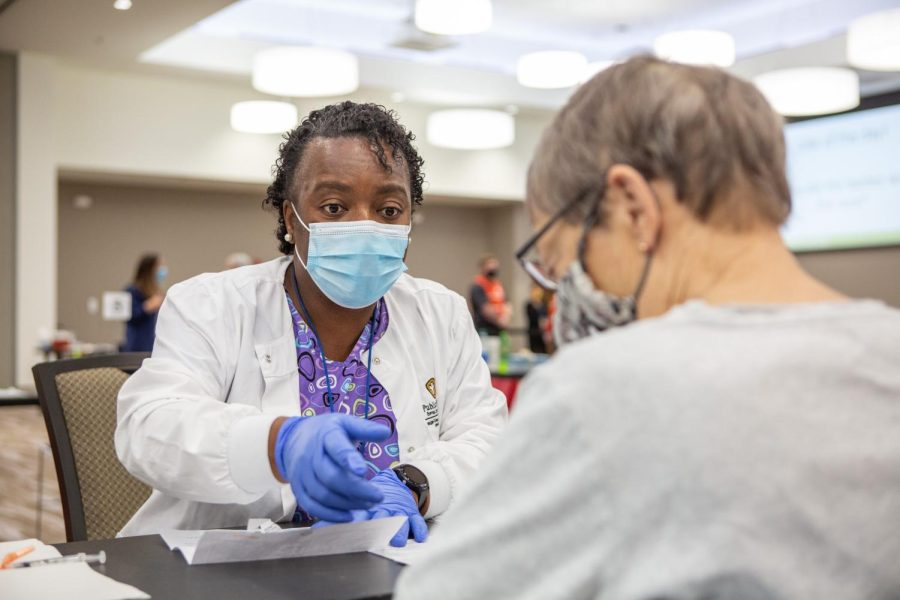Pandemic strengthens UI students’ passion for health care
A woman administers a Moderna vaccine at the I Hotel and Conference Center on Jan. 11. Even with the pressures healthcare workers faced within the past year, students’ passion in pursuing this field strengthens.
Oct 20, 2021
University students interested in the medical field said the COVID-19 pandemic has strengthened their passion for health care.
Jonathan Lee, second-year student in Medicine, said he knows the path he chose and will always try to make a difference in his patients’ lives regardless of circumstances.
“This is what I want to do with my life, no ifs or buts about it, regardless of circumstances,” Lee said.
For Heera Imran, sophomore in AHS and on the pre-medicine track, seeing frontline health workers sacrifice so much in this time of crisis has reinforced her desire to become a doctor.
“I’ve become more passionate about it because I want to make sure when I do become a physician — I want to make sure that I’ve given it my all,” Imran said.
Get The Daily Illini in your inbox!
Sarah Cho, sophomore in LAS, said her lifelong dream of becoming a nurse hasn’t changed between before COVID-19 and now, except she’s more sure than ever that this is something she wants to do in the future.
“To pour out the sacrificial love that these nurses pour out into their patients and everything … I hope that in everything in my ability, I can do that if that situation were to arise again,” Cho said.
There is still some pressure that comes with entering health care in a time when nurses and doctors are feeling burned out, Cho said.
A year into the pandemic, a nationwide survey by the Kaiser Family Foundation and the Washington Post found that about three in 10 healthcare workers have considered leaving the profession.
More than half of those surveyed reported being burned out, and about six in 10 say stress from the pandemic has harmed their mental health.
“It really made me reflect: Am I strong enough to process everything and still be like the voice of reason and hope for patients?” Cho said. “But I’m hopeful because nursing has been something that I’ve been so sure of.”
Cho pointed to the Hippocratic Oath that most medical students take after graduation where they promise to put patients first, and she said it’s something she wants to uphold.
“It’s naive of me to think that since I haven’t even entered in the field, but I just know that I want to do the best that I can to maintain that promise when I make that,” Cho said.
Imran also said she has doubted herself — not that she didn’t want to pursue medicine but more doubting her abilities in rising up to the challenge.
“But I feel like no matter what, if you’re passionate about something you want to do, you shouldn’t have a problem with it,” she said. “If I want something, I’m going to go after it.”
All these students began their interest in medicine by observing physician-patient relationships around their family.
Cho said she grew up surrounded by “amazing” nurses, speech pathologists and doctors due to health conditions among her family and herself. And it inspired her to give back.
Imran spent her evenings after high school in hospitals, acting as a translator for her Pakistani grandparents who traveled to the U.S. seeking better cancer treatments.
“The littlest things, just to see how they were treating patients, it brought a warm feeling to my heart,” Imran said. “Because that’s my grandpa, and someone’s being just as affectionate toward my grandpa as I was to him.”
It’s these doctor-patient relationships that Lee said are so important in today’s age of misinformation and politics — something that has been more apparent with the pandemic.
Lee said he spends a lot of time breaking down misconceptions about the virus or vaccines in an effort to be transparent with patients, family and friends.
“We’ve seen so much division in our country over the last several years,” Lee said. “But I’m hoping we can get to a place where physicians can treat their patients and patients can trust their physicians.”
This trust is one of the biggest takeaways for Lee throughout the pandemic.
“I think it’s something that, you know, anybody interested in the medical field should cherish,” he said. “When someone trusts you and you’re able to answer their questions and lead them on a path, it’s a great thing.”
Through the pandemic, Cho said she’s learned more about the value of empathy with all people, not just patients.
“Adversity looks different in everybody, and it’s a spectrum of struggles,” Cho said. “And we’re all going through this together.”






